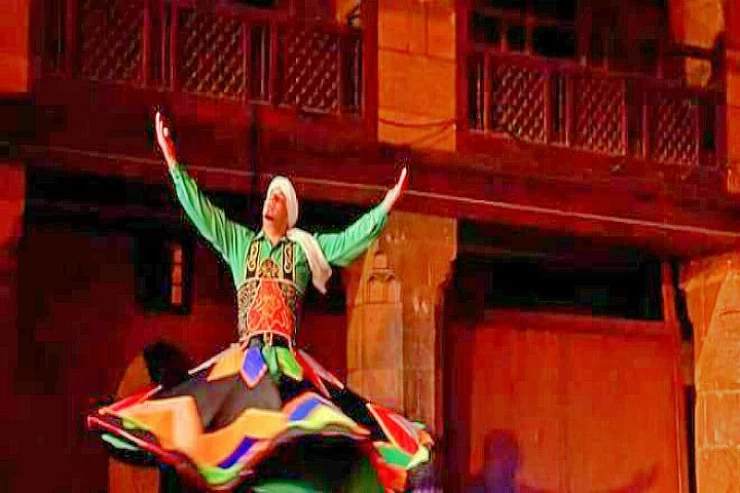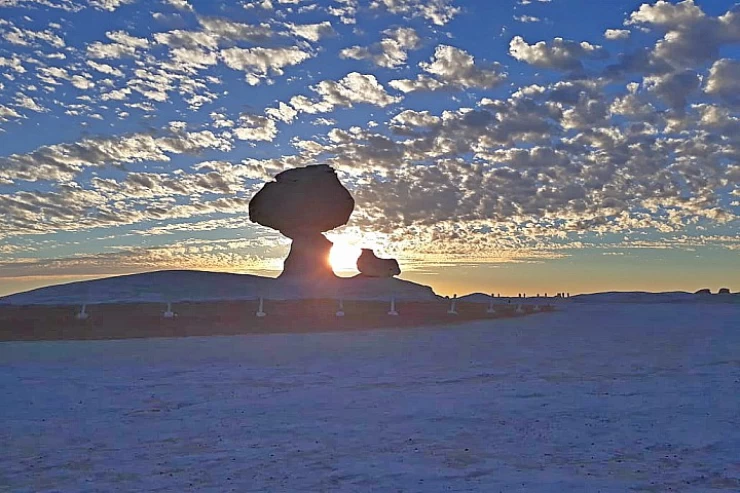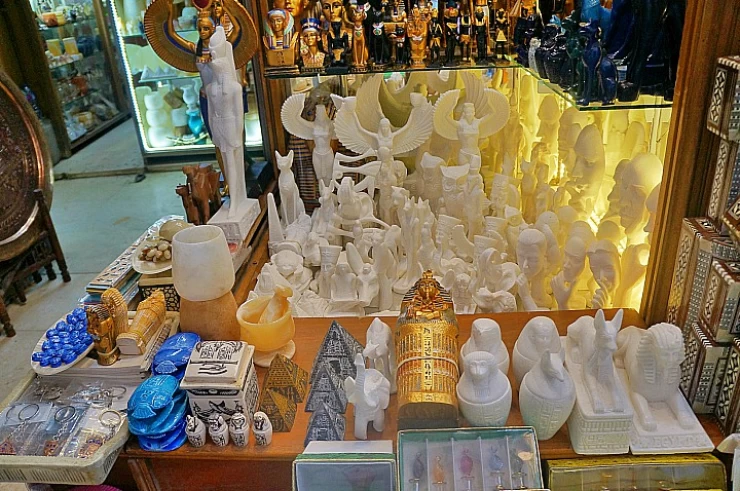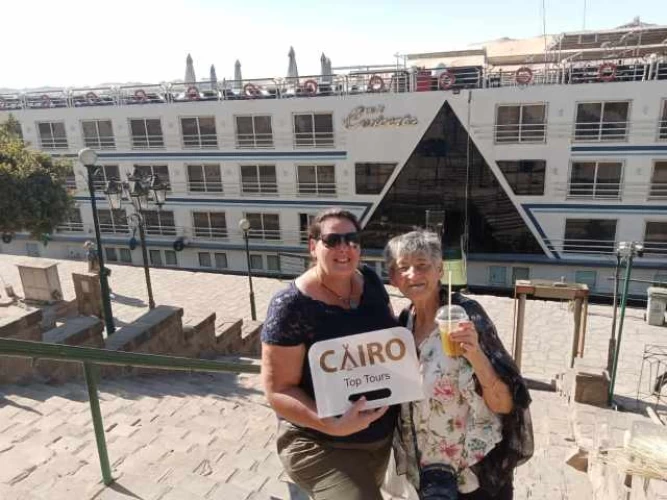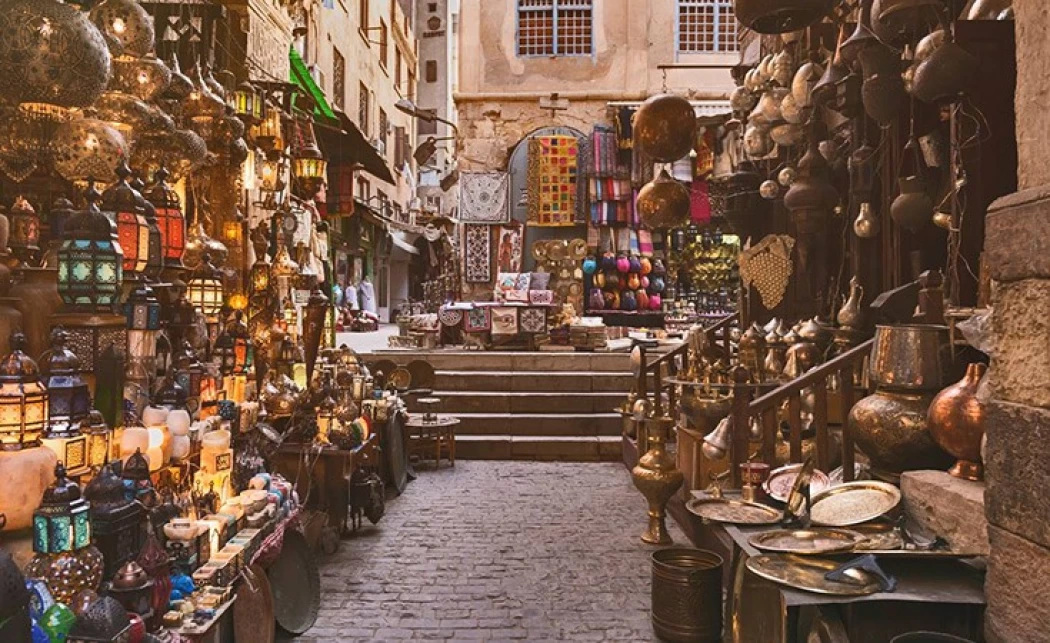
Bazar di Khan El Khalili
Bazar di Khan El Khalili
Se vieni a visitare l'Egitto, puoi andare a visitare il Bazar di Khan El Khalili, che una volta era il sito di un mausoleo noto come turbot az-Za'faraan (Tomba dello Zafferano), che era il luogo di sepoltura dei califfi Fatimidi ed ora è uno dei mercati più popolari del Cairo islamico, e veramente fantastico.
Durante il regno del sultano mamelucco Barquq, il primo sultano mamelucco, l'Egitto fu stato colpito dalle devastazioni della peste nera, ma continuò ad essere il centro della favolosa impresa economica, con molti edifici commerciali e religiosi ancora in costruzione in questo momento.
L'Egitto è pieno di souvenir esotici realizzati con tutti i tipi di materiali come argento, oro, pietra, cotone e lana che i turisti vorrebbero acquistare durante le loro vacanze in Egitto. Questo è il luogo dove i turisti possono trovare prodotti egiziani genuini.
L'antica area di Khan al-Khalili, uno dei luoghi più vivaci e delle cose da fare al Cairo attraverso i nostri pacchetti di vacanze o le escursioni giornalieri, ha 600 anni, è considerato uno dei mercati più antichi in Egitto e nel Medio Oriente e la sua architettura antica è stata preservata sin dall'era mamelucca, secondo il servizio informazioni statale egiziano.
Khan El-Khalil non è stato influenzato dalle ingiurie del tempo, ed è rimasto un'ispirazione per autori ed artisti, quindi sono pronti alla creatività, come ha scritto, Naguib Mahfouz, il suo romanzo "Khan Al-Khalili" descrive l'atmosfera del vecchio quartiere, poiché i corridoi laterali intersecano la strada originale, i lati dei corridoi e la strada stessa sono affollati di negozi come orologiai, calligrafi e caffetterie, un quarto per i tappeti, un quinto per l'antiquariato e così via. Mentre si trova qua e là ci sono caffè che non sono più grandi delle dimensioni di un piccolo negozio, i produttori si sono seduti davanti ai negozi sdraiati nella pazienza per la loro arte.
Il bazar Khan El Khalili si trova vicino alla moschea di Al-Azhar ed è incluso nella maggior parte dei tour giornalieri del Cairo al Cairo islamico, nel mezzo della zona di attività più economica del Cairo. Questa zona economica e commerciale si estendeva lungo il principale asse nord-sud della città, (via al-Mu'izz), ed era anche il sito privilegiato di molti complessi religiosi monumentali costruiti durante il periodo mamelucco ed oltre.
Qualunque cosa tu stia acquistando, preparati a contrattare, dove è un rito valido sia per i clienti egiziani che per i turisti. Non ci sono regole rigide, tranne una: se non si negozia, c'è una seria probabilità di pagare un importo molto più alto per l'oggetto

Il nostro team ti aiuterà a viaggiare in Egitto e sperimentare il tempo soleggiato del nostro bel paese durante la Pasqua, grazie alla loro vasta conoscenza del turismo egiziano. Potresti dedicare il tuo pacchetto selezionando uno dei nostri pacchetti di viaggio in Egitto o sfruttare al massimo il tuo tempo in una breve visita, imparando di più sulla storia egiziana e le sue affascinanti storie e vivendola attraverso tour privati al Cairo. Partecipa ad uno dei nostri tour economici in Egitto attraverso il deserto del Sahara, come i tour di Siwa dal Cairo, per esempio, o preferibilmente i tour nel Deserto Bianco d'Egitto. Scoprireste i nostri tour di un giorno ad Assuan, fareste una gita di un giorno da Assuan ad Abu Simbel, o viaggereste via terra e vi godeste i nostri tour di un giorno a Luxor per vedere gli incredibili templi di Karnak, il Tempio di Luxor, il Tempio di Hatshepsut, e vedreste le meravigliose tombe splendidamente dipinte nella Valle dei Re, questo è il luogo dove i re e i governanti del nuovo regno riposano in pace ed imparereste i loro riti di mummificazione e sepoltura.
Possiamo vivere un'esperienza davvero emozionante esplorando le rovine di Tanis in Egitto. Vedremo cascate incredibili e potremo esplorare insieme tutti i luoghi più belli.
Khan KEl Khalili Bazaar is omnipresent in Islamic Cairo as the oldest and most well-known market in the Middle East. Tracing its origins back to the 14th century, this colorful bazaar has been a center of trade, culture, and art for over 600 years. As a tourist or traveler who has come to Cairo more than once and knows the place inside and out, Khan El Khalili will always provide an experience that is packed with charm and historical significance, as well as that exotic, unforgettable touch.
A Walk Through History Emir Djaharks El Khalili formed Khan El Khalili in 1382, and he built it as a caravanserai where traders could rest and keep their goods. Over the years, it transformed into a huge bazaar where various regions’ traders gathered to sell spices, silks, and other precious metal products, among others. The bazaar continues to have narrow alleyways and cluttered stalls constructing similar old houses, which are such that the visitors feel as if they have traveled back in time.
Khan El Khalili is viewed as a priceless resource of ancient Coptic arts in modern Cairo, retaining its medieval elements. The market’s winding passages are filled with haggling customers and vendors, hungrily inhaling the scent of different spices, while artisans are busy producing everything from jewelry to leather.
Unveiling the Hidden Treasures of the MarketEvery nook and cranny in Khan El Khalili has something different to offer. This makes it a traveler’s and shopper’s utopia filled with endless options. These are some of the orders of interest:
Some of the founders: Find Khan El Khalili, and every Egyptian will get some handicrafts and souvenirs. In the bazaar, you’ll also find more than just delicately crafted gold and silver wear, including foreign hand-carved wooden boxes, and brass, and colored glazed mosaic lantern lamps. Hand-serrated: Several artists, such as glass blowers, carpet makers, and silver craftsmen, work in small studios within the market, allowing for their work to be seen in the process of creation. These are artists who have mastered their art over many years. Another interesting aspect of the very well-known marketplace is the perfume stores, which have Egyptian-made perfumes in small, fragrance-filled glass bottles easily arched for cheap prices. These perfumes are made from plants made in Egypt.
2. Medicinal plants and spice shops
Stirring Hints of Tantalizing Spices: The spice markets of Khan El Khalili are a sight to behold. You will find large piles of various spices, such as saffron, cumin, cardamom, cinnamon, and many more, filling the stalls and creating a rich aroma. Healthy Stuff: As well as that, you are likely to come across natural herbs and some other products, like tea made out of hibiscus flowers, black seed, and camphor. Some of them sell these herbs and answer questions regarding the side effects of these herbs.
3. Papyrus and Ancient ObjectsPapyrus Art of Ancient Egypt: As you stroll around the market, you will find many stores depicting Egyptian art on papyrus where talented artists reproduce scenes from ancient Egypt. Such unique paintings feature deities, the royal rulers, and even the ancient writing system, providing a glimpse of the history of Egypt.
Reproduction Artifacts: There are various statues of ancient Egyptian gods, such as the dog-headed god Anubis, goddess Bastet, and Horus, as well as other mock tomb-style jewellery sold at some of the stores in the area.
Textiles and Dressing Dresses and Garments: For those considering themselves fashionistas of some sort, the bazaar also offers not only definitely outdated but some stylish galabeya long robes and even kaftan dresses, along with some embroidered scarves and shawls.
Traditional Weaves: Other striking traditional handlooms, together with carpets like Egyptian cotton and kilim, tell much about the area’s interlacing art.
Khan El Khalili Hotels: Landmarks and GastronoIn addition to shopping, there is a possibility for tourists to enjoy the typical food of the country and get acquainted with the culture in som
1. El Fishawi’s Café:
the one owned for centuries (Café of Mirrors)Historical Context: El Fishawi’s Café is one of those old Cairo cafes that has withstood the test of time over 200 years. The place has been visited by most renowned Egyptian authors, painters, and intellectuals, and therefore, eternally seems frozen in time.
Atmosphere and Ambiance: Situated at the center of the bazaar, El Fishawi’s has an inviting warm atmosphere, owing to its adorned walls with mirrors, wooden tables, and busy patrons. It is an ideal place for taking a break while sipping either mint tea or Turkish coffee and simply enjoying the passing crowd.
Shisha Tradition: For those interested in trying shisha, El Fishawi’s is an excellent place to indulge in this traditional water pipe, available in a variety of flavors, from apple to grape.
2. Local street food
Delectable Snacks: As you wander through Khan El Khalili, you’ll find street vendors selling Egyptian snacks such as taameya (Egyptian falafel), samosas, and koshari. These treats offer a delicious and affordable way to experience the local cuisine.
Sweet Delights: Don’t miss out on basbousa (sweet semolina cake) and konafa (a dessert made from thin noodles soaked in syrup), which are popular Egyptian sweets.
Cultural Experiences: Art, Music, and Stories
Khan El Khalili is not just a marketplace; it’s a cultural hub where you can immerse yourself in Cairo’s vibrant arts scene.
1. Traditional Sufi Performances
Al-Tannoura Dance Troupe: At Wekalet El Ghouri, a nearby historic venue, you can witness the Al-Tannoura Dance Troupe, which performs a mesmerizing blend of Sufi music and dance. The whirling dervishes, dressed in colorful skirts, spin in time with the music, creating a hypnotic display of devotion and artistry.
2. Live music and street performersStreet Artists: Throughout the bazaar, you may encounter street performers, including musicians playing traditional instruments like the oud and qanun, adding to the lively atmosphere of the market.
Storytellers: Occasionally, you may find traditional storytellers, or hakawati, who share folk tales and legends of Cairo, providing a glimpse into Egypt’s rich oral history.
An early evening visit would be best since the bazaar starts lighting up, with the sound of music and performances turning Khan El Khalili into a stage for living culture.







